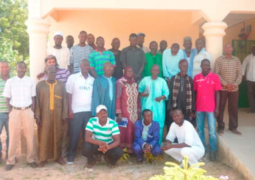AGOA is a US legislation approved in May 2002 to assist the economies of sub-Saharan Africa, and to improve economic relations between the United States and Africa.
The centerpiece of America’s economic engagement in Africa, AGOA is a progressive US trade and investment policy towards sub-Saharan Africa that is reducing barriers to trade, increasing exports, creating jobs, and “expanding opportunity for Africans to build better lives.”
AGOA provides trade preferences to countries that are making progress in economic, legal, and human rights reforms. Under AGOA, eligible countries can export almost any product to the United States duty-free, covering about 6,400 products.
“AGOA also provides a framework for technical assistance to help countries take advantage of the trade preferences,” said US Embassy Charge d’Affaires in The Gambia.
Whereas The Gambia has been AGOA eligible since 2004 and its status being renewed annually, the country and our local businesses and entrepreneurs have not been reaping the benefits of AGOA, in spite of the fact that we have product items such as seafood, garments, handicrafts, specialty foods and ceramics, with which we can penetrate and compete in the US markets.
But why are we not utilizing the Opportunity?
“The trade opportunities under AGOA are, therefore, enormous but the challenge remains on the ability of local businesses to access and fully benefit from AGOA,” Gambia’s Trade minister said at the awareness-raising workshop.
Market access conditions, means of access under AGOA and the support requirement of businesses in beneficiary countries like The Gambia are fully recognized, the Trade minister states.
“Despite the available support measures, the utilization rate of preferences under the scheme is still minimal in the case of The Gambia.”
As the minister rightly said, we have a big task at hand; to ensure our local businesses and entrepreneurs rise up to the challenge of realizing the broad objectives set under AGOA and the attached benefits.
“This calls for enormous complementary endeavours not only by the government, but also by local operators and strategic partners such as the West Africa Trade Hub to help unlock the businesses’ potentials to harness the valuable benefits under AGOA.”
The two-day workshop is, therefore, expected to adequately identify key challenges faced by local businesses to export under AGOA, and increase the rate of utilization for The Gambia.
It is but time our Gambia entrepreneurs started to be imaginative in what they do and in the design and finishing of their products, since “competition in the US market is extremely high and only the finest products will sell well.”
“We can choose a future where we export more products and outsource fewer jobs.”
Barack Obama




